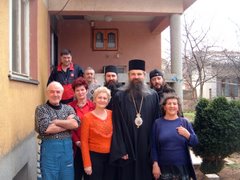These speeches are from the website antiwar.org
Vojislav Kostunica'sCampaign Speeches 9/20/00
Anti War Editorial note: We present below two campaign speeches by the candidate of the united Democratic Opposition of Serbia (DOS), Vojislav Kostunica, delivered before the DOS pre-election convention. You can read a campaign speech by Slobodan Milosevic, by clicking here.
Dear Friends, Belgrade, Serbia,
We are given a great opportunity and a great chance to begin a different life in a different state after September 24. But first let's see what kind of state we live in today. Woe is the state and wretched the life we lead in it.
Woe is the state whose freedom depends on one single man. Woe is the state whose welfare depends on one single man. Woe is the state whose defense depends on one single man. Woe is the state that is a hostage to one single man.
And it must be terrifying, and burdensome, to be that man. I would certainly fall short of such an onerous task, I must confess. Such an enormous responsibility would no doubt scare me. I would have to step down.
Slobodan Milosevic does not want to step down. He experiences himself as a King who is the Sun. The King who used to say: apres moi le deluge. And who nearly flooded the state.
I am an ordinary, average man. It has never occurred to me to see myself as some historic greatness. I have never dreamed about some global historic mission of mine.
I only know that what you want, and what I want, of course, is to live in an ordinary, average European country. A state free from within, democratic, that is. A state free towards the outside, that is to say independent. A state of average standard of living. Average relations with other states. Average membership of international organisations. Average economy. An average industrial growth. An averagely stable national currency. Average banks. Averagely supplied shops. Average salaries and pensions, which are averagely regular. An average social care system. Average health care. Average media in which field or cultural events would hit the headlines. In a word, a state of averagely European everything.
Some would say: averages are boring, there is nothing exciting about them, nothing vivid. Something is always going on here.
Yes, indeed! Something has been going on for more than half a century, more intensively so over the last decade. These dramatic events of ours have made us all but unique in the world. What have we been through? The wars in which we did not take part, but coffins reached us nevertheless. The waves of refugees - our kinsmen exiled from their hearths over the Drina River. The Serb border along the Drina. Inflation that took our breath away. Queues for all kinds of everything. Sanctions. Isolation. The media demonisation of our country. NATO's criminal and frantic bombing of our country. Declared war victory in the wake of the Kumanovo capitulation. Foreign troops and foreign administration in Kosovo, the very same troops and administration the Socialist Party of Serbia claims Slobodan Milosevic, precisely the one who brought them in, will chase away in less than no time.
I am absolutely sure that we have tired of all those stormy and tempestuous events. What we need is the New-Testament "peace amongst ourselves." We need calm. We need a kind of life in which excitements would be confined primarily to the personal plane - let the public, political life be monotonous, even boring if you like.
In a nutshell, what we need is a normal and civilised state. A mundane and replaceable authority, whose term in office would be limited time-wise. An ordinary, democratic state where law rules. And order. A state in which the authorities fear the people, not vice-versa. A state whose citizens would not live in the permanent fear of destitution and poverty.
This is the only state the Democratic Opposition of Serbia and I can offer to you. The country not to be bordered by bloody rivers, the one in which we would never be menials or servants to anyone, be they foreign or domestic conquerors. The country that, ordinary as it is, all of us would love and build in peace.
You have heard the offer. It is up to you to verify it on September 24. May God give us all wisdom and courage to win freedom. For Serbia, of course.
Speech #2
How miserable is this life of ours now... How miserable is the state whose freedom depends on a single man how poor and miserable is the state whose prosperity depends on a single man (the public jeering and booing again), how miserable is the state whose defence and protection depends on that man.
Miserable is the country taken hostage by only one man. This must be terrifying and horrible for that man, the current Yugoslav president. I admit that I would be also terrified if I were in his shoes. I admit that I would withdraw if I were in his position. But Slobodan Milosevic would not do that for anything in the world
He's acting as if he were Louis XIV, Le Roi Soleil; he's behaving as if there will be nothing left after he's gone. Today our state is drowning beneath him. I'm just an ordinary man, just like all of you, and my intention is not to try to change the world, my intention is to change this state of ours for the better. I'm well aware that you want to live in a normal democratic state which should be integrated in the mainstream of Europe.
We wish to live in a state which is free and wise, and therefore, democratic. Both you and I wish to live in a state which is independent. We all wish to live in an average country in which everything would be normal and average: media, health care, social security, economy.
We want to live in an normal European state. So little and yet so much we need to do in order to achieve our goal. However, there are those people who say that whatever is average is also boring to death. So many turbulent and catastrophic events have been happening for the past decade... for the past ten or even fifty years.
Let's see what these dramatic events have brought to us: wars in which "we haven't been involved" and yet corpses and coffins have been streaming from those war-plagued territories back to the country. These horrible events resulted in columns of refugees streaming from the predominantly Serb-populated region of Krajina in Croatia towards Serbia, and then from the southern Serbian province of Kosovo to Serbia proper.
The consequences of those horrible events are isolation, sanctions, queues, social unrests, insecurity, uncertainty... last year's villainous NATO bombing campaign against our country... In the aftermath of such a chain of sinister events we have been presented by fait accompli reflected in the signing surrender papers in Kumanovo, Macedonia, and yet ironically, this shameful capitulation has been declared a victory by the regime of Slobodan Milosevic.
Today we have foreign troops and foreign administration in the southern Serbian province. Those people who brought those foreigners to Kosovo certainly will not drive them away from the province. Entire Serbia wants to live at peace with the world. Our wish is to translate the New Testament's message of peace into reality.
We wish to live in peace, in a democratic state, in a state with the rule of law and order, in which the authorities will be in fear of the will of the people, and not vice versa. Let us wish to live in a country in which its citizens will have no reason to fear misery and poverty, in a state of peace and serenity.
This is what the Democratic Opposition of Serbia and myself, as the presidential candidate, are pledging to fulfill. This is our promise. This is our political platform for the upcoming elections. This is a platform which could be summed up in one word only - PEOPLE. Their political agenda could be summed up in a single word - POWER, power at any cost, holding on to power until the last citizen of Serbia is sacrificed for their benefit.
The Serbian Democratic Opposition and I, as the presidential candidate, are promising that after September 24 our country will not be governed by foreigners, our adversaries, occupying forces... we, the people, will take over the reins of power. Dear Belgraders, dear Serbia, this is our offer. Now it's up to you to accept and verify our offer on Sunday, September 24. Let good Lord help us and give us enough courage and wisdom to win freedom on September 24 for the whole of Serbia. OF COURSE


















